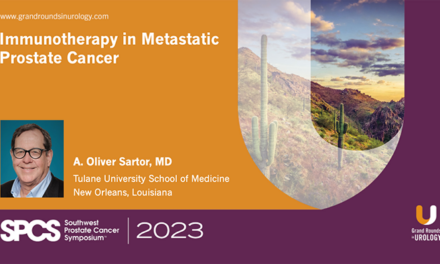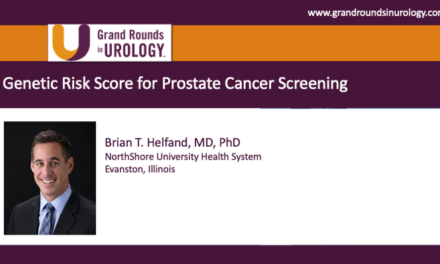Rana R. McKay, MD, presented “Patient Selection in Metastatic Hormone-Sensitive Prostate Cancer (mHSPC)” during the 33rd International Prostate Cancer Update on January 23, 2023, in Vail, Colorado.
How to cite: McKay, Rana R. “Patient Selection in Metastatic Hormone-Sensitive Prostate Cancer (mHSPC).” January 23, 2023. Accessed Sep 2025. https://grandroundsinurology.com/patient-selection-in-metastatic-hormone-sensitive-prostate-cancer-mhspc/
Patient Selection in Metastatic Hormone-Sensitive Prostate Cancer (mHSPC) – Summary
Rana R. McKay, MD, Associate Professor of Medicine at the University of California, San Diego, and Co-Leader of the Genitourinary Oncology Disease Team at the Moores Cancer Center, discusses patient selection and the treatment landscape in metastatic hormone-sensitive prostate cancer (mHSPC). Dr. McKay assesses three overarching factors that impact treatment decisions: disease, clinical, and drug, as well as how to optimize them. She begins with high and low volume/risk disease explaining that high volume tumors indicate higher risk disease and low volume indicate lower risk disease. The CHAARTED and LATITUDE studies use different definitions of high volume/high risk and low volume/low risk but actually demonstrate concordance across these terms. Dr. McKay then describes doublet treatment for high volume/risk patients, showing that androgen deprivation therapy (ADT) plus an androgen receptor signaling inhibitor (ARSi) improves patient outcomes. For low volume/risk patients, there is a clear benefit in using ARSi along with ADT, but the data are mixed when looking at the addition of docetaxel. She turns next to triplet therapy noting that the PEACE-1 and ARASENS trials showed a similar improved overall survival benefit with a combination of ADT, docetaxel, and either darolutamide or abiraterone, setting a new standard of care over doublet therapy. Shifting to clinical factors, Dr. McKay points out consideration for each of the medication options and their related side effects, like hypertension, edema, hair loss, fatigue, hypothyroidism, and cord compression. Last, she discusses drug factors including duration, cost, and mechanism of action. Dr. McKay concludes with a review of clinical trials on the horizon, most of which are expected to complete sometime in 2024 and will further inform treatment options for patients with mHSPC.
About The 33rd Annual International Prostate Cancer Update:
The International Prostate Cancer Update (IPCU), founded in 1990, is a multi-day CME conference focused on prostate cancer treatment updates with expert, international faculty. It is led by expert physicians and is designed for urologists, medical oncologists, radiation oncologists, and other healthcare professionals involved in the diagnosis and treatment of prostate cancer. The 33rd iteration of the meeting occurred January 22-25, 2023 in Vail, Colorado. To view more educational presentations from IPCU 33, visit our collection page.
ABOUT THE AUTHOR
Rana R. McKay, MD, is a Professor of Medicine at the University of California, San Diego, and co-leader of the Genitourinary Oncology Disease Team at the Moores Cancer Center. Dr. McKay specializes in treating people with urogenital cancers, including bladder, kidney, prostate, and testicular cancer. Her research interests include the design and implementation of clinical trials to advance the treatment of patients with urologic cancers.





